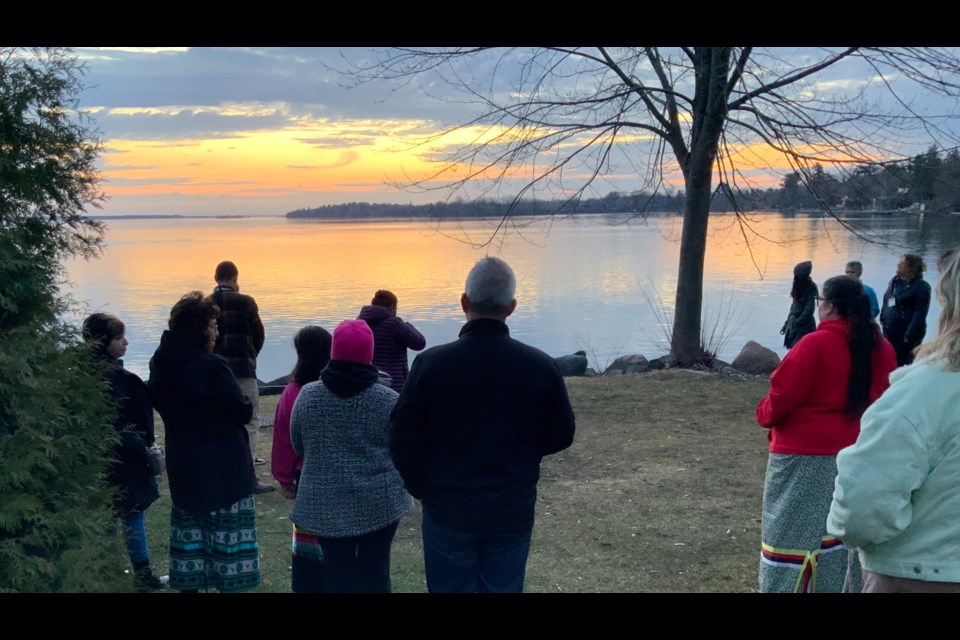In between the darkness of the night and the coming of a new day is a faint light. A light cast from the place of the ancestors. It is a light of hope.
The Anishinaabeg (Ah-nish-ih-naw-behg) call it Biidaaban (Bee-daw-bun). It is a revered place in our stories of the spirit world. An honourable place of being where the ancestors gather to dispatch ancient messages heralding love for their kin, the living - Us.
I think of this place called Biidaaban as a body of early risers gather along the calm waters on the southern shores of Lake Simcoe this early spring morning.
As the dawn begins to colour the sky with masterful artistry, we begin a sunrise ceremony led by Shelley Charles, a respected elder Kwe (Kwheh, woman) from the Chippewas of Georgina Island First Nation.
She lays her tools of ritual on the ground and speaks to us in a gentle, calming voice and asks us to form a circle around a smudge bowl that holds sage, which she ignites. The sage burns generously for a brief period before settling to a spiraling coil of smoke lifting into the morning sky like doves on a mission to deliver messages of praise.
It is never lost on me that the Anishinaabeg were once prohibited from practising these ancient rituals on these very shores as we were guarded from doing so by an early settler government.
We are no longer arrested and incarcerated for performing our rituals but to me, it is still an act of resistance to stand here in ceremony. It is an homage to those ancestors who held strong in the face of oppression and hid the ceremonies away from the prying eyes of those who thought themselves as their masters.
In ceremony I am nullifying that subjugation and like the smoke that lifts from the smudge bowl I am cleansing our past.
On this morning, as we begin to see a hint of daylight, we pray and give thanks to our creator for all that we have been given. We give thanks and pray for the birds that have now begun to loudly sing all around us, oblivious of our presence as they acknowledge the day in their own ancient ceremony.
Then, elder Shelley lifts the drum and sings a song in Anishinaabemowin (Ah-nish-ih-naw-beh-moh-win), the Ojibwe language. The waters seem to ripple and to come alive upon hearing the language returned to this spot. This place along the shoreline once held by the old ones, now suppressed by urbanization.
She sings for the plants, the animals, the trees, and for the water, once pristine. She sheds a tear in song for all that we have grieved and for all that we yet hope to achieve in a world where water has become a secondary musing. A world that perceives water as a commodity. A world that is reliant on chemicals to cleans its drinking water. So much so that it then gives less regard to the lifeblood that is held for us in these great glacial pools like Lake Simcoe.
The darkness gives way to light as purples merge with yellows in the sky above. Biidaaban brings more birds as flocks of migrating waterfowl take up their place in the water behind us and begin their ritual dances atop the glass surface hoping to impress a suitor.
Amik (Ah-mick) the beaver, glides past, almost nonchalant, but with a close eye on our ceremony. Amik's ancestors knew of ours.
Biidaaban is the place of the ancestors. It is where we will all go to. And when we do, we are spoken of as a revered being. In Ojibwe, it is a customary practice to add the suffix “ban” (bun) to a person’s name after they have started their journey into the spirit world to join those ancestors. It is an honorary tag that is attached to the earthly name you leave behind.
The blessings, greetings continue as we bring the ceremony to a close, but not before being joined by Waagosh (Waw-gohsh) the red fox who appears from behind a hedge, curious about our morning rituals as he/she goes about theirs.
The Anishinaabeg (Ah-nish-ih-naw-behg) sunrise ceremony is as old as Aki (Ah-kih), earth itself. For it was Aki who first acknowledged the grandfather sun as he gifted us a new day. Since time immemorial, Aki has been a part of this ceremony. We had learned it from her.
I am filled with pride and overwhelming gratitude whenever I am called upon to participate in sunrise ceremonies. Moreso, since coming to realize that as a new light shines upon us, we can now openly, without restraint, in resistance, ignite the hopes and dreams of Anishinaabeg who came before us, now and forever.
Jeff Monague is a former Chief of the Beausoleil First Nation on Christian Island, former Treaty Research Director with the Anishnabek (Union of Ontario Indians), and veteran of the Canadian Forces. Monague, who taught the Ojibwe language with the Simcoe County District School Board and Georgian College, is currently the manager of Springwater Provincial Park. His column appears every other Tuesday.



